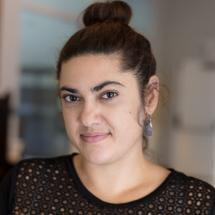Abstract
In this interview, Lydia Curliss, Physical Sciences, and Native American and Indigenous Studies, Librarian at Brown University and member of Nipmuc Nation of Massachusetts, shares her thoughts on the COVID-19 global pandemic, the Black Lives Matter movement, and the fight for Indigenous rights.
Curliss begins explaining that nobody realized they would be social distancing or working remotely for a long period of time. She talks about learning how extroverted she is and the challenges she has faced with limited contact with other people. Curliss also shares her struggle with anxiety and ways she is finding solace through science and risk assessment. She adds that had she known the ways her life would change in the pandemic she would have prioritized living with a friend or family member and would have better managed her own expectations for her productivity. Additionally, she goes on to detail how her work with faculty and students has morphed in a virtual setting. She also predicts changes to her workflow on the three-semester system announced by President Christina Paxson in early July 2020.
Curliss also discusses the death of George Floyd at the hands of Minnesota police. She remembers needing to reduce her time on social media and her concern about protesting while COVID-19 remains a threat. She considers challenges of equity and inclusivity in various communities and links them back to capitalism and white supremacy. She summarizes that her ideal society would be one where everyone is thoughtful and considerate of each other and willing to lift each other up without fear of being pushed down.
Curliss continues by discussing current fights for Indigenous rights and recognition. She talks about the July 2020 Supreme Court case, McGirt v. Oklahoma, which confirmed that much of eastern Oklahoma falls within an Indian reservation. She also talks about the Washington national football team agreeing to change their name and mascot, but asserts that while these changes are positive they are not enough. Finally, she addresses concerns that elder Native/ Indigenous knowledge bearers, language keepers, and ceremony holders are disproportionately falling ill with COVID-19 and explains the urgency to capture this information as quickly and safely as possible.
Recorded on July 16, 2020 via Zoom
Interviewed by Amanda Knox, Pembroke Center Assistant Archivist
Suggested Chicago style citation: Curliss, Lydia. Interview. By Amanda Knox. Pembroke Center Oral History Project, Brown University. July 16, 2020.
Biography
Lydia Curliss is a subject librarian for the physical sciences, and Native American and Indigenous studies at Brown University, which she started in 2019. At Brown, she engages and supports faculty, students and staff in her subject areas, and is a team member for the Center for Digital Scholarship’s Database of Indigenous Slavery in the Americas project. She holds her MLS and MIS from Indiana University, which she received in 2018, and a BA in Geology from Oberlin College, which she received in 2013. Curliss is a member of the Nipmuc Nation, a state recognized tribe in Massachusetts.
